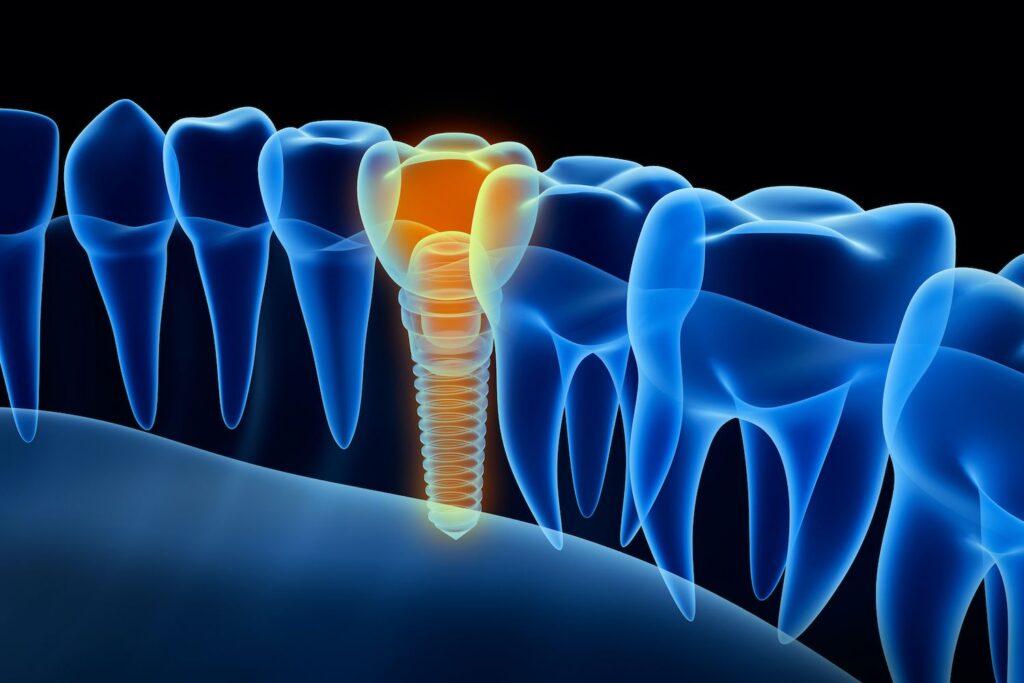When it comes to replacing missing teeth, two main options stand out: dental implants and dentures. Both offer unique benefits and come with their own set of challenges. We will help you understand the differences and decide which option might be right for you.

What Are Dental Implants?
Dental implants are artificial tooth roots made of titanium. Dentists surgically place them into your jawbone. These implants serve as a sturdy base for crowns, bridges, or dentures. They essentially mimic the function of natural tooth roots. Dental implants can last a lifetime with proper care. They integrate with your jawbone, providing a stable foundation for artificial teeth. This makes them feel and function like natural teeth. Implants also help maintain the structure of your jawbone, preventing bone loss that often occurs with missing teeth.
What Are Dentures?
Dentures are removable appliances designed to replace missing teeth and surrounding tissues. They come in two main types: complete and partial. Complete dentures replace all teeth in the upper or lower jaw, while partial dentures replace some teeth and are anchored to your remaining natural teeth. Dentures are custom-made to fit your mouth, offering a quick solution for tooth loss. They are a popular choice due to their lower cost and non-invasive nature. However, they may require adjustments over time to maintain a good fit.
Benefits of Dental Implants
Dental implants offer numerous advantages. They provide a permanent solution for missing teeth. Unlike dentures, implants do not slip or move, offering a secure and comfortable fit. Implants help maintain jawbone health by stimulating bone growth, which prevents bone loss. They are easy to care for—just brush and floss like you would with natural teeth. Additionally, implants can enhance your ability to chew and speak, and they improve the overall aesthetics of your face by preventing the sunken look that often accompanies tooth loss.
Benefits of Dentures
Dentures also have their own benefits. They are more affordable upfront and provide a non-surgical option for tooth replacement. You can remove them for cleaning, making them easy to maintain. Dentures offer a quick solution to tooth loss without the need for surgery. They are customizable, allowing for a natural look that matches your existing teeth. Dentures are also easy to adjust, ensuring a comfortable fit over time. For those who need an immediate solution, dentures can be a great option.
Drawbacks of Dental Implants
Despite their benefits, dental implants do have some drawbacks. The process requires surgery, which can be lengthy and involve multiple dental visits. Implants can be expensive, with costs ranging from $3,000 to $5,000 per tooth. The process may take several months, involving multiple visits to the dentist. Surgical complications, though rare, can occur. Implants are not suitable for everyone, especially those with insufficient jawbone or certain medical conditions. The recovery time can also be longer compared to dentures.
Drawbacks of Dentures
Dentures come with their own set of downsides. They may not fit perfectly, causing discomfort and potential embarrassment if they slip.
- Can slip or move
- Require regular adjustments
- May affect speech and eating
- Less durable than implants
- Can cause sore spots
Dentures need regular adjustments to maintain a good fit. They may affect how you speak and eat, as they can slip or move, especially when eating certain foods. Dentures are less durable than implants and typically need replacement every 5-10 years. They can also cause sore spots in your mouth if not fitted properly.
